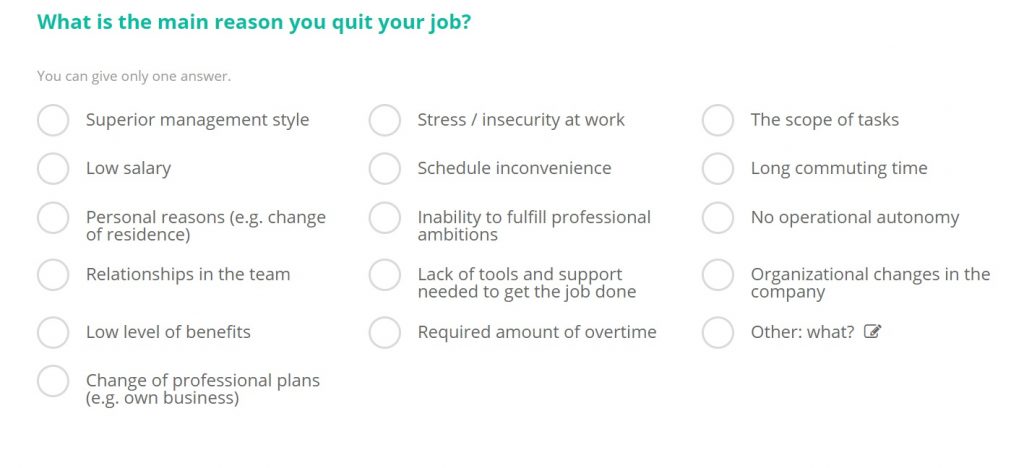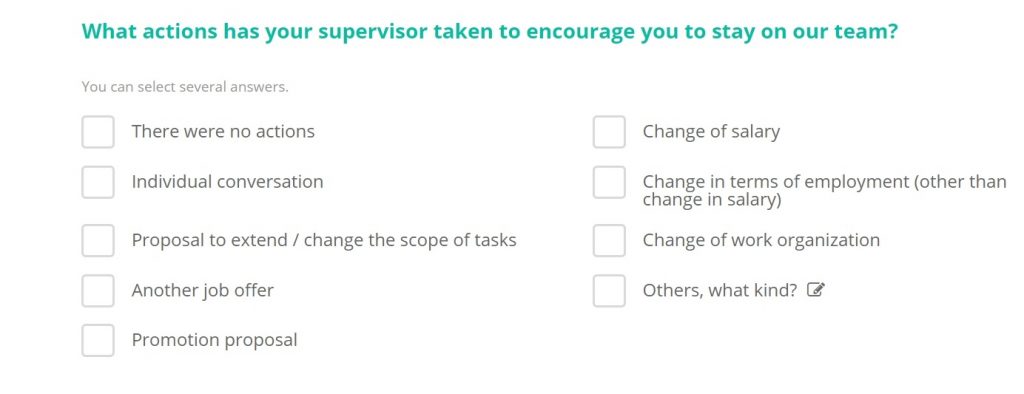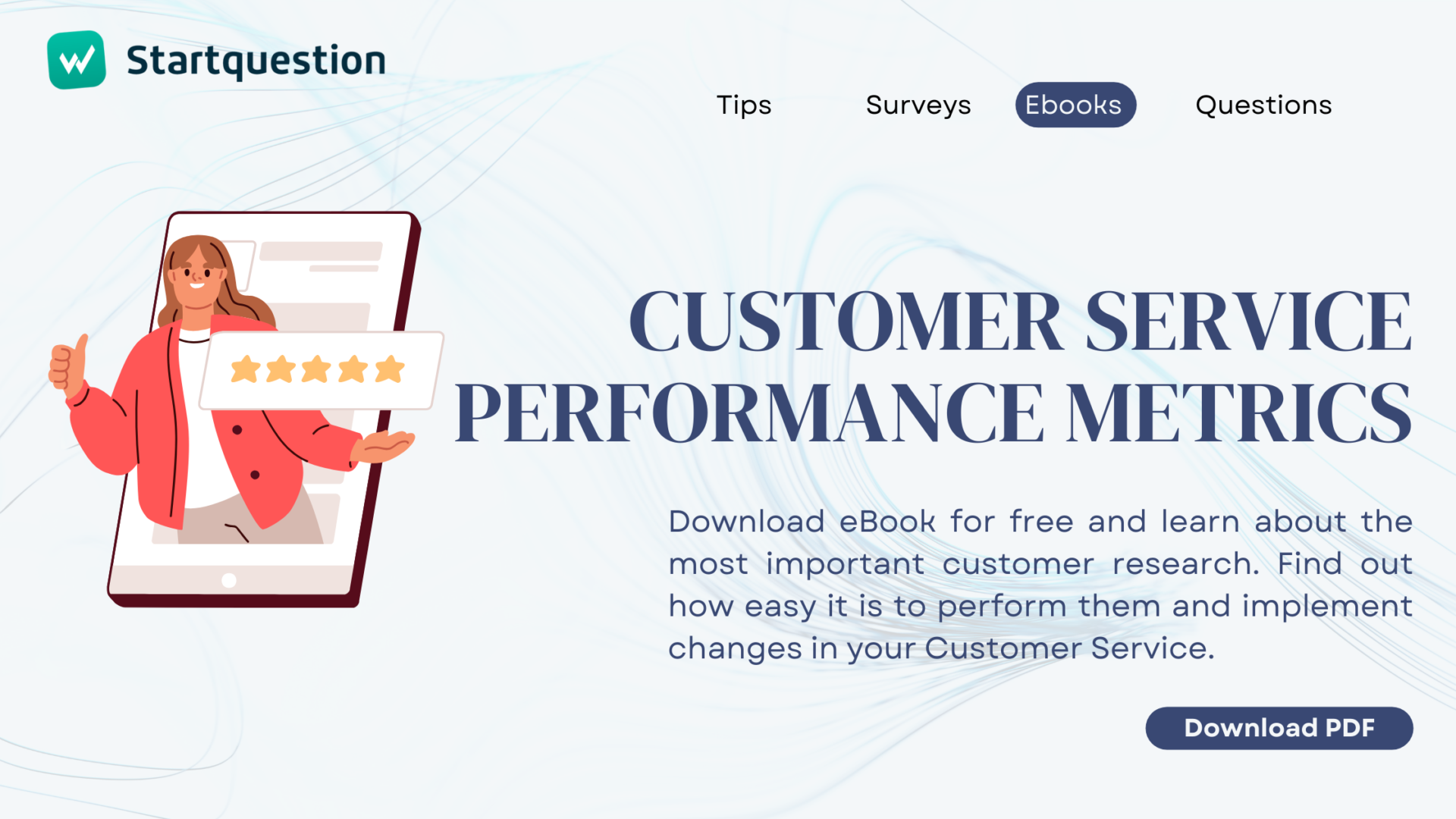Employees leaving the company may be a unique source of insights for human resources specialists. We want to show you the most common exit interview questions and a ready-to-use survey template. We also asked industry experts to explain the significance of exit surveys and what is happening with the information obtained from former employees after the offboarding process. Don’t miss the opportunity to collect this feedback.
Why Are Exit Interviews Important?
The short definition says that the exit survey is a study of the reasons why an employee leaves the organization. This tool is also used to get an honest opinion about the terms of employment, relations with the supervisor/coworkers, and everyday life in the company.
According to the latest research by HR Rebels, employee exit interviews are Poland’s most popular HR surveys. 61.8% of companies in the country ask exiting employees for their feedback. Polish employers are not alone in this trend. Exit surveys are also popular worldwide.

Exit interview helps to understand the reasons for quitting the job.
Why Is Conducting Exit Interviews So Popular?
We asked an HR expert to cover this one for you.
“Conducting exit interviews might lead a company to uncover unique insights about its culture. When still at a company, employees may feel reluctant to share constructive criticism for fear of that being held against them. But when they are on their way out of the organization, they often become a lot more outspoken in pointing out areas for improvement. These unique learnings should be examined and – when justified – acted on by the company to improve its working environment,” – explains Zbig Motak, Director, Talent Acquisition at DuckDuckGo.
We already know why it’s common to conduct exit surveys. Time to look at some standard exit interview questions to prepare a template for your HR surveys.
Employee Exit Interview
Thanks to implementing exit interviews at your company you will get valuable knowledge concerning what should your company improve in order to avoid losing valuable employees in the future.
Get inspired by the ready-to-use Exit Interview Template
12 Best Exit Interview Questions You Should Ask Your Employee
The offboarding process applies to every industry. Each profession and position has typical questions reserved for its niche. Exit interview questions for managers will differ from those asked of nurses, police officers, or trainees in a marketing agency.
Below we have compiled sample exit interview questions that can help you prepare a questionnaire and gain valuable feedback from exiting employees. Use this template as a starting point to create the optimal survey for your organization’s needs.
Why Did You Begin Looking for a New Job?
Any HR specialist must understand the reasons why employees leave their company. Perhaps, behind most of the layoffs in a particular department, there is a low personal culture of the manager or a lack of clear guidelines for promotions and raises. Watch the results for trends and repeating responses.
What Did You Like Best and Least About Your Job?
It’s too late to measure employee satisfaction, but it’s a one-of-a-kind opportunity to ask what the company’s most robust and weakest sides are. Such insights are a valuable tool for HR teams as they can use them to convince future employees to accept their offer. Importantly, we can count on honest feedback during the exit interview.
What Are You Most Looking Forward to in Your New Job?
It is another question HR specialists should include in the exit interview survey. By asking about what an exiting employee expects most from a new workplace, we will find out what is missing in our organization’s offer for top-notch candidates.
Did You Feel You Had the Tools and Resources to Be Successful in Your Role?
A professional exit interview process helps to investigate the company’s shortcomings. Don’t be afraid to ask for constructive feedback on whether the organization provides current and future employees with the necessary tools and resources to perform their duties effectively.
Were You Satisfied with the Way You Were Managed?
Companies conduct exit interviews also to find out how managers perform their duties. Repeated negative feedback about a particular supervisor should illuminate a red alarm light in management heads.
It may work the other way as well. Exiting employee may praise their manager and decide to part ways with the company on other grounds (i.e., personal reasons, work-life balance, better job offer, or benefits package).
Did You Have Clear Goals and Objectives?
Exit surveys often reveal not only shortcomings in team management but also unfair or unclear rules of promotions and granting pay raises. Employee morale will decline over time if they do not know the goals of their job. During the research, it is worth checking how the company’s processes look in practice.
Did You Receive Feedback to Help You Improve?
Company culture has many elements. An impactful part of it is the ability to share opinions about the employee and supervisor’s work. An exit survey is an ideal opportunity to check the effectiveness of this process. Do employees receive constructive feedback and are eager to share their insights?
Would You Recommend Working at Our Company to a Friend?
Employee’s answer to the classic NPS (Net Promoter Score) question will tell us a much about the company. It is valuable information about employee satisfaction, loyalty, and whether work in our organization is worth recommending.

Sample NPS question to ask in the exit interview.
How Our Company May Improve Training Programs?
To retain talent in your company, you have to show that you care about employee development. During the exit interview, ask about the complete training assessments and what you can improve so that the training better meets the needs of other employees.
What Would You Change If You Could Change Anything about Your Job or the Company?
Due to the honest feedback you can expect, ask a former employee what they would change in the company. Perhaps a single answer will not give a complete picture, but the study of trends will help determine the direction of possible changes and detect problem situations in the organization.
Would You Consider Returning to the Company? Under What Circumstances?
It’s a follow-up question to learn more about the reasons for the employee’s decision. Ask them in the exit survey whether they would like to return to the company in a former position (or new position). If so, on what conditions? Is it about job satisfaction? Team collaboration? Co-worker attitude? Better company culture? Irreversible career change? Money? Gather actionable insights from departing employees to improve retention in your company.
Do You Have Any Other Comments You’d Like to Address?
You can prepare the best exit interview questions, but always give a departing employee the opportunity to add something from themself (outside the survey template). It is a unique opportunity to collect valuable feedback to improve management practices, human resources processes, or other significant company success factors.

One more common exit interview question to ask in your survey.
What Does HR Do With Exit Interview Results?
Before we move to the summary, we need to answer one more important question. What do human resources specialists do with all the data acquired during exit interviews?
The voice of every departing employee can have a massive impact on company policies, the situation of current employees, company culture, and new employees. It may have, provided that the conclusions from exit interviews are correctly used by persons responsible for HR in the company.
What’s the Value of Exit Interview For a Company?
Once again, we’ve picked the industry expert’s brain to provide meaningful insights.
“The feedback collected from the exit interview is the basis of an action plan, which may refer to the team, manager, or organization (processes and culture). Such a plan is usually prepared together with the manager or the team and contains specific initiatives that must occur to prevent further departures in the future” – clarifies Katarzyna Mierzejewka, People & Culture Partner at HR Hints, the first HR boutique dedicated to startups and fast-growing tech companies.
“We may also use exit interview feedback for positive purposes – in one of the organizations where I worked, we’ve added the question: “Who would you like to appreciate?”. It usually made the person return with thanks to the people they just mentioned”.
HR Hints expert highlights one more important advantage of conducting an exit interview.
“When a former employee wants to return to the company after some time, their exit survey feedback serves as the basis for a conversation before a decision to re-hiring them. Suppose an employee in the exit interview indicated the reason (e.g., management of the CEO), which did not disappear during their absence (the CEO still manages the company). In that case, there is a red flag over the re-employment,” – says Katarzyna Mierzejewska.
How to Conduct an Effective Exit Interview – Tips & Sum Up:
Employee experience surveys can bring a lot of benefits to your organization. However, it requires proper preparation. Before starting your research, it is necessary to keep the following in mind:
- Timing is critical – an exit survey is the last part of the offboarding process
- Keep it casual and personal. Make the employee feel comfortable
- Prepare exit interview template & exit interview questions in advance
- Listen more than talk. Remember: You’d probably never get such honest feedback from current employees.
Try one of the best employee feedback survey tools for free!
Start trial period without any credit card or subscription and easily gather impactful feedback via link, social media, email, and more.
No credit card required · Cancel any time · GDRP Compilant
Effective exit interview requires giving the floor to the departing employee and listening to their concerns. Most often, the discussion occurs face-to-face with an HR specialist. Sometimes it’s conducted during the phone call or by online communication tools.
HR surveys sent via e-mail are also gaining popularity. It isn’t easy to replace a face-to-face interview, but online survey software can help you with questionnaire development, data analysis, reporting, and much more.




